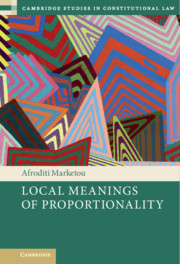Book contents
- Local Meanings of Proportionality
- Cambridge Studies in Constitutional Law
- Local Meanings of Proportionality
- Copyright page
- Contents
- Acknowledgements
- 1 Proportionality as a Cultural Practice
- Part I Questioning the Success of Proportionality
- 2 Proportionality in French Public Law: Plus Ça Change, Plus C’est la Même Chose
- 3 Proportionality in English Public Law: Continuity and Change
- 4 Proportionality in Greek Public Law:
- Conclusion of Part I
- Part II Great Expectations
- Part III European Integrations
- Conclusion
- Bibliography
- Index
2 - Proportionality in French Public Law: Plus Ça Change, Plus C’est la Même Chose
from Part I - Questioning the Success of Proportionality
Published online by Cambridge University Press: 08 July 2021
- Local Meanings of Proportionality
- Cambridge Studies in Constitutional Law
- Local Meanings of Proportionality
- Copyright page
- Contents
- Acknowledgements
- 1 Proportionality as a Cultural Practice
- Part I Questioning the Success of Proportionality
- 2 Proportionality in French Public Law: Plus Ça Change, Plus C’est la Même Chose
- 3 Proportionality in English Public Law: Continuity and Change
- 4 Proportionality in Greek Public Law:
- Conclusion of Part I
- Part II Great Expectations
- Part III European Integrations
- Conclusion
- Bibliography
- Index
Summary
This chapter traces the spread and evolution of proportionality in French public law. I argue that the most important advances in French judicial review have occurred without recourse to proportionality terminology. And where this terminology finally spread in case law, it has not brought about radical changes to judicial methods. In reality, proportionality has been much more useful in the analysis and the reconstruction of judicial practice than in the justification of judicial decisions. Contrary to the dominant view, which traces the first applications of proportionality back to the 1930s, the chapter shows that proportionality language emerged in expropriation case law during the 1970s. Soon, the concept of proportionality in the legal literature was detached from the actual application of proportionality as a norm or principle. In the context of constitutionalisation of the legal order, proportionality was recognised as a constitutional principle and was transferred as a method for the adjudication of constitutional rights. However, a survey of the relevant practice reveals a peculiar French version of proportionality analysis.
Keywords
- Type
- Chapter
- Information
- Local Meanings of Proportionality , pp. 45 - 74Publisher: Cambridge University PressPrint publication year: 2021



